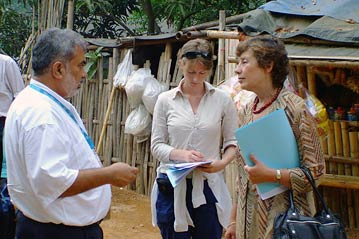Assistant High Commissioner for Protection in Lebanon
Assistant High Commissioner for Protection in Lebanon
After wrapping up a visit to Syria, UNHCR's Assistant High Commissioner for Protection, Erika Feller, is in Lebanon to look closely at the conditions of refugees in the country and to discuss, in particular, the situation of some 40,000 Iraqi refugees with Lebanese senior officials.
Feller has expressed appreciation for the flexible and humanitarian approach adopted by the Government of Lebanon towards Iraqi refugees despite the complexity of the Lebanese situation and in light of its security concerns. Some of the estimated 40,000 Iraqis in Lebanon have been there for some years, while others have arrived after 2003.
Feller is meeting today with the Lebanese Minister of the Interior, Hassan El Sabeh, in order to raise UNHCR's concern about the detention of refugees and asylum seekers, especially prolonged and indefinite detention. The meeting is also an opportunity for UNHCR to encourage the government to continue to play a constructive role in the protection of refugees and asylum seekers and to find the balance between the security concerns of the country and the humanitarian needs of refugees.
Feller paid a visit to Roumieh Prison, the largest detention centre in the country. Well over 400 people of concern to UNHCR, mostly Iraqis, are detained there, mainly for illegal entry or illegal stay. A few others are held in other facilities, but Roumieh is the main detention centre. Feller met with Iraqi refugees in their cells; saw first-hand their conditions of detention and heard directly from them the stories behind their flight to Lebanon. Of particular concern is the fact that many refugees suffer prolonged detention periods, even beyond the normal expiry of their sentence, with no prospect of release in sight unless they agree to return to Iraq. Among countries in the region, Lebanon has the highest number of detained refugees and asylum seekers.
Only a small proportion of those detained have actually registered with UNHCR.
Most Iraqis in Lebanon have not registered with us, although the numbers have risen in recent months. We have so far registered a total of 7,878 Iraqis in Lebanon and expect that figure to reach 10,000 by the end of the year.
Yesterday (Thursday), Feller visited the village of Bint Jbeil, a south Lebanon village that was severely damaged during the July war between Israel and Hezbollah. She noted that the humanitarian consequences of the war were still very visible, and examined for herself the progress made in implementing a recovery project run by UNHCR and funded by the European Commission. The project targets vulnerable displaced Lebanese and returnees, through direct assistance to over 30 Social Development Centres. After visiting the Social Development Centre of Bint Jbeil and meeting with centre's director, Feller was pleased to hear positive feedback about UNHCR's contribution to support the centres as well as our efforts to invest in recovery and assist vulnerable people affected by the war.
The Lebanon visit follows a three-day mission to Syria during which Feller met with Syrian authorities, Iraqi and Palestinian refugees and UNHCR's partners. Feller also visited Al Tanf camp in the no-man's land between Iraq and Syria, home to some 350 Palestinian refugees from Iraq who have been stranded there since April 2006. The refugees strongly appealed for a solution to their plight and that of another 1,400 Palestinians in Al Waleed camp just inside Iraq. They said that even though they had managed to survive for some time in this wasteland, they should be treated like human beings and life was no longer sustainable there. They also noted that while fleeing Iraqis could be admitted elsewhere, they as Palestinians had nowhere to go. Feller highlighted the intense efforts undertaken by UNHCR over the past year with different countries to find a humane solution. So far, UNHCR has received some positive signals, but no concrete offers to resettle this group. Feller said she remained hopeful and promised that UNHCR would actively continue looking for safe haven for this desperate group.






